Strategies for an Effective Pedagogical Resource Tool
VerifiedAdded on 2022/01/04
|9
|3102
|43
Report
AI Summary
This report delves into the concept of pedagogy, emphasizing its crucial role in shaping effective teaching and student learning. It explores various pedagogical approaches, including critical evaluation, dialogue-based learning, and student-centered methodologies. The report highlights the importance of collaborative activities, language development across the curriculum, and connecting pedagogy to students' lives for enhanced learning outcomes. It also discusses the significance of providing academic support and implementing conversational teaching techniques to foster student engagement and understanding. The report underscores the benefits of pedagogy in developing skills for both teachers and students, facilitating effective communication, and preparing academic curricula that cater to diverse student needs, including those with special learning requirements. Ultimately, the report advocates for pedagogical strategies that promote student success and overall academic excellence.
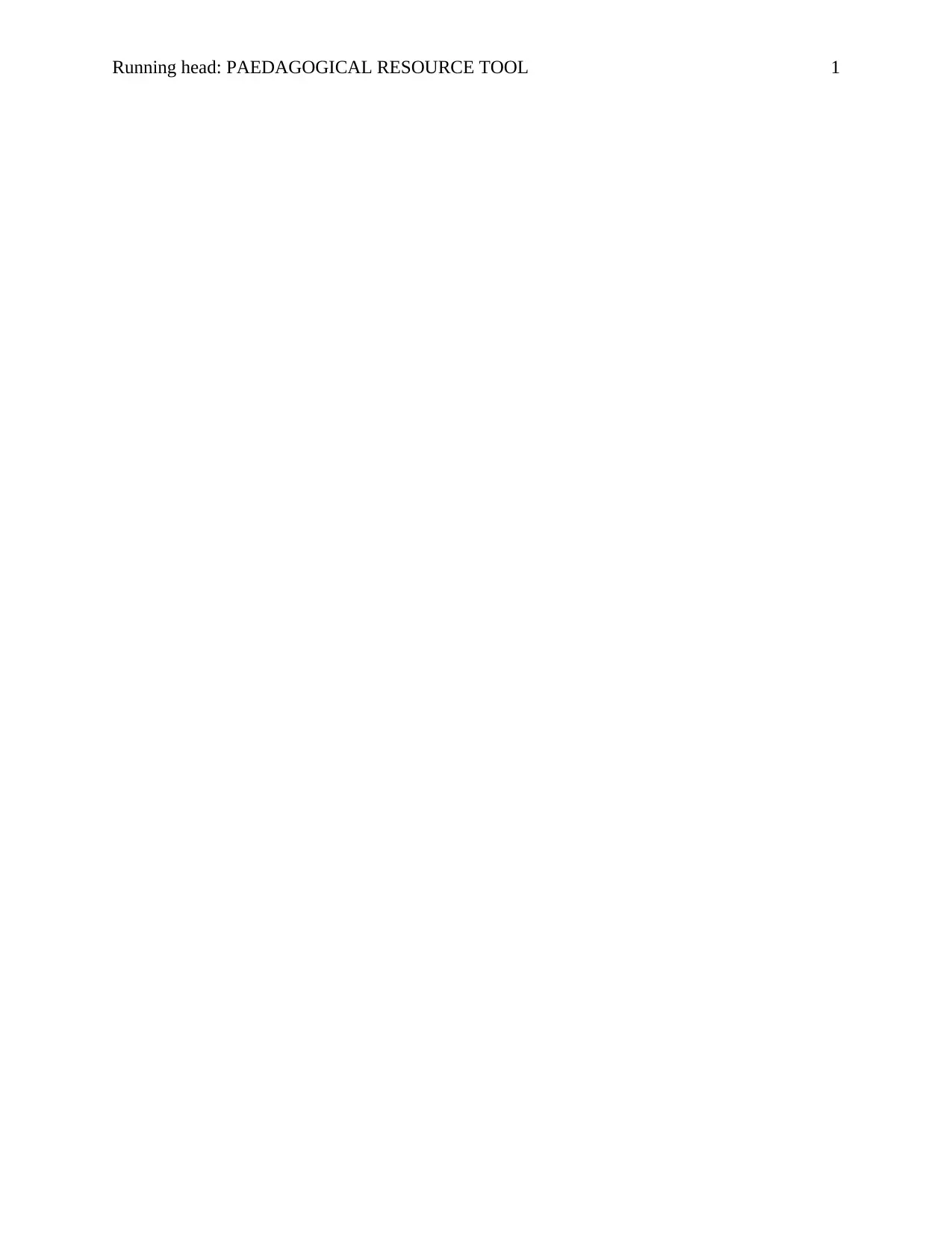
Running head: PAEDAGOGICAL RESOURCE TOOL 1
Paraphrase This Document
Need a fresh take? Get an instant paraphrase of this document with our AI Paraphraser
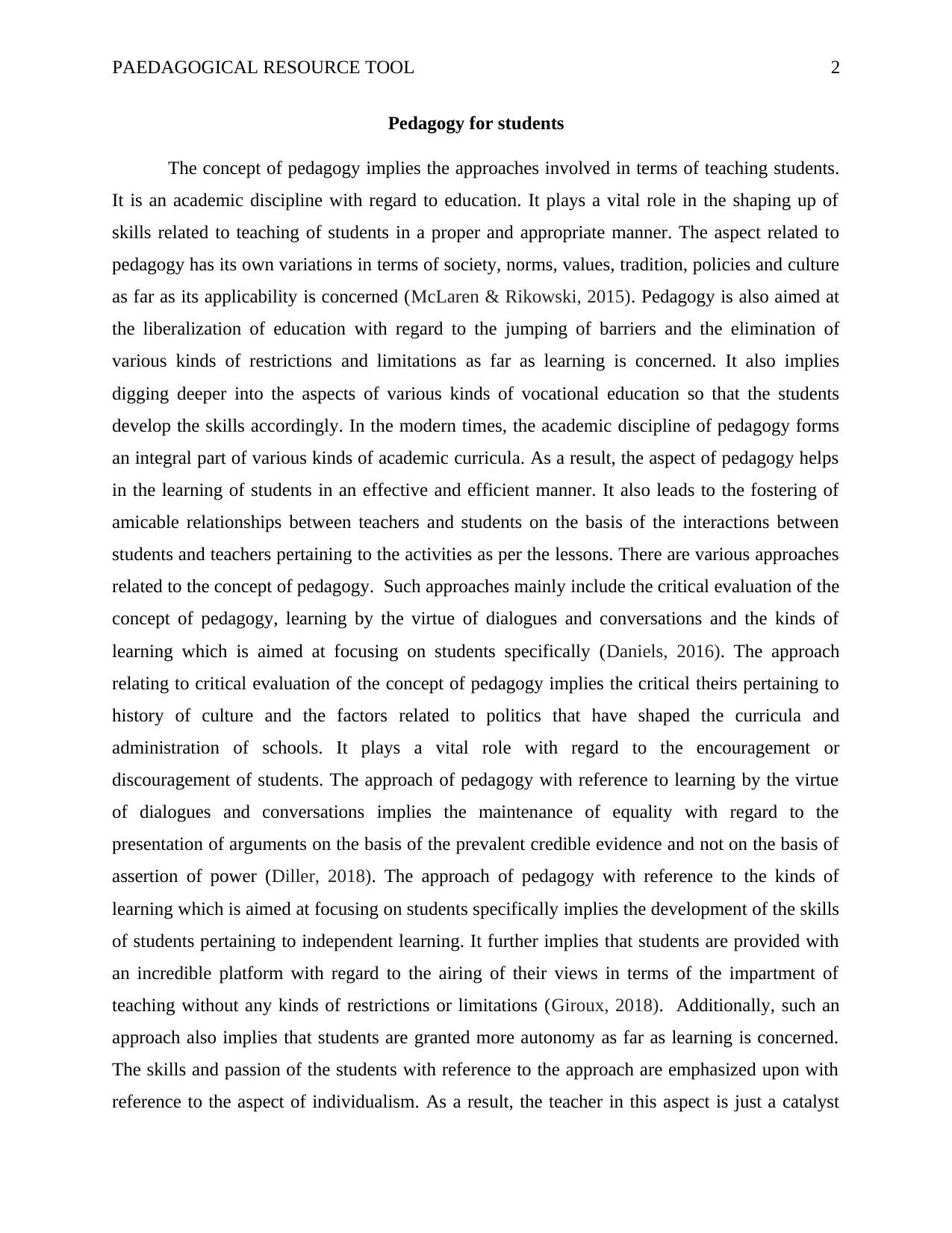
PAEDAGOGICAL RESOURCE TOOL 2
Pedagogy for students
The concept of pedagogy implies the approaches involved in terms of teaching students.
It is an academic discipline with regard to education. It plays a vital role in the shaping up of
skills related to teaching of students in a proper and appropriate manner. The aspect related to
pedagogy has its own variations in terms of society, norms, values, tradition, policies and culture
as far as its applicability is concerned (McLaren & Rikowski, 2015). Pedagogy is also aimed at
the liberalization of education with regard to the jumping of barriers and the elimination of
various kinds of restrictions and limitations as far as learning is concerned. It also implies
digging deeper into the aspects of various kinds of vocational education so that the students
develop the skills accordingly. In the modern times, the academic discipline of pedagogy forms
an integral part of various kinds of academic curricula. As a result, the aspect of pedagogy helps
in the learning of students in an effective and efficient manner. It also leads to the fostering of
amicable relationships between teachers and students on the basis of the interactions between
students and teachers pertaining to the activities as per the lessons. There are various approaches
related to the concept of pedagogy. Such approaches mainly include the critical evaluation of the
concept of pedagogy, learning by the virtue of dialogues and conversations and the kinds of
learning which is aimed at focusing on students specifically (Daniels, 2016). The approach
relating to critical evaluation of the concept of pedagogy implies the critical theirs pertaining to
history of culture and the factors related to politics that have shaped the curricula and
administration of schools. It plays a vital role with regard to the encouragement or
discouragement of students. The approach of pedagogy with reference to learning by the virtue
of dialogues and conversations implies the maintenance of equality with regard to the
presentation of arguments on the basis of the prevalent credible evidence and not on the basis of
assertion of power (Diller, 2018). The approach of pedagogy with reference to the kinds of
learning which is aimed at focusing on students specifically implies the development of the skills
of students pertaining to independent learning. It further implies that students are provided with
an incredible platform with regard to the airing of their views in terms of the impartment of
teaching without any kinds of restrictions or limitations (Giroux, 2018). Additionally, such an
approach also implies that students are granted more autonomy as far as learning is concerned.
The skills and passion of the students with reference to the approach are emphasized upon with
reference to the aspect of individualism. As a result, the teacher in this aspect is just a catalyst
Pedagogy for students
The concept of pedagogy implies the approaches involved in terms of teaching students.
It is an academic discipline with regard to education. It plays a vital role in the shaping up of
skills related to teaching of students in a proper and appropriate manner. The aspect related to
pedagogy has its own variations in terms of society, norms, values, tradition, policies and culture
as far as its applicability is concerned (McLaren & Rikowski, 2015). Pedagogy is also aimed at
the liberalization of education with regard to the jumping of barriers and the elimination of
various kinds of restrictions and limitations as far as learning is concerned. It also implies
digging deeper into the aspects of various kinds of vocational education so that the students
develop the skills accordingly. In the modern times, the academic discipline of pedagogy forms
an integral part of various kinds of academic curricula. As a result, the aspect of pedagogy helps
in the learning of students in an effective and efficient manner. It also leads to the fostering of
amicable relationships between teachers and students on the basis of the interactions between
students and teachers pertaining to the activities as per the lessons. There are various approaches
related to the concept of pedagogy. Such approaches mainly include the critical evaluation of the
concept of pedagogy, learning by the virtue of dialogues and conversations and the kinds of
learning which is aimed at focusing on students specifically (Daniels, 2016). The approach
relating to critical evaluation of the concept of pedagogy implies the critical theirs pertaining to
history of culture and the factors related to politics that have shaped the curricula and
administration of schools. It plays a vital role with regard to the encouragement or
discouragement of students. The approach of pedagogy with reference to learning by the virtue
of dialogues and conversations implies the maintenance of equality with regard to the
presentation of arguments on the basis of the prevalent credible evidence and not on the basis of
assertion of power (Diller, 2018). The approach of pedagogy with reference to the kinds of
learning which is aimed at focusing on students specifically implies the development of the skills
of students pertaining to independent learning. It further implies that students are provided with
an incredible platform with regard to the airing of their views in terms of the impartment of
teaching without any kinds of restrictions or limitations (Giroux, 2018). Additionally, such an
approach also implies that students are granted more autonomy as far as learning is concerned.
The skills and passion of the students with reference to the approach are emphasized upon with
reference to the aspect of individualism. As a result, the teacher in this aspect is just a catalyst
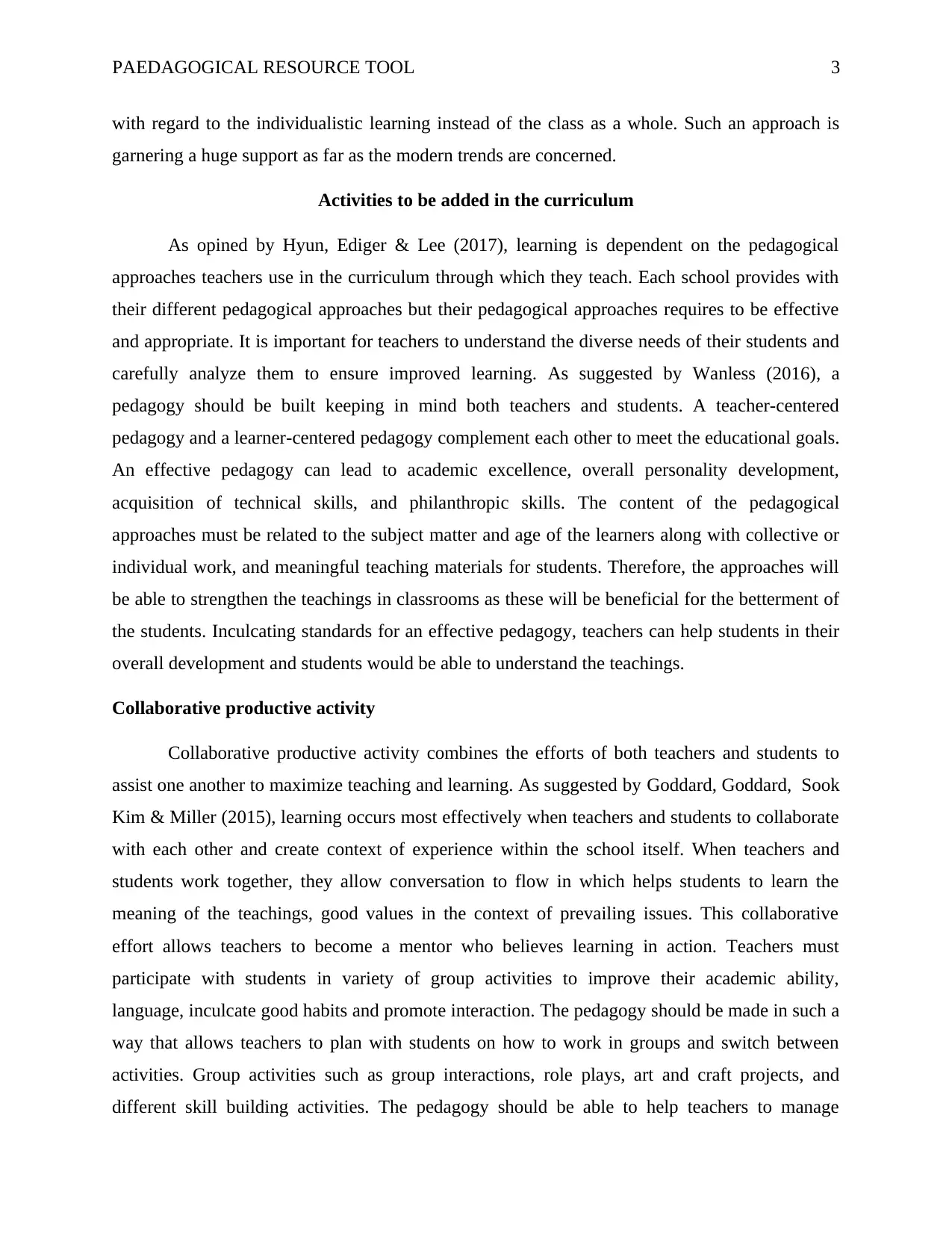
PAEDAGOGICAL RESOURCE TOOL 3
with regard to the individualistic learning instead of the class as a whole. Such an approach is
garnering a huge support as far as the modern trends are concerned.
Activities to be added in the curriculum
As opined by Hyun, Ediger & Lee (2017), learning is dependent on the pedagogical
approaches teachers use in the curriculum through which they teach. Each school provides with
their different pedagogical approaches but their pedagogical approaches requires to be effective
and appropriate. It is important for teachers to understand the diverse needs of their students and
carefully analyze them to ensure improved learning. As suggested by Wanless (2016), a
pedagogy should be built keeping in mind both teachers and students. A teacher-centered
pedagogy and a learner-centered pedagogy complement each other to meet the educational goals.
An effective pedagogy can lead to academic excellence, overall personality development,
acquisition of technical skills, and philanthropic skills. The content of the pedagogical
approaches must be related to the subject matter and age of the learners along with collective or
individual work, and meaningful teaching materials for students. Therefore, the approaches will
be able to strengthen the teachings in classrooms as these will be beneficial for the betterment of
the students. Inculcating standards for an effective pedagogy, teachers can help students in their
overall development and students would be able to understand the teachings.
Collaborative productive activity
Collaborative productive activity combines the efforts of both teachers and students to
assist one another to maximize teaching and learning. As suggested by Goddard, Goddard, Sook
Kim & Miller (2015), learning occurs most effectively when teachers and students to collaborate
with each other and create context of experience within the school itself. When teachers and
students work together, they allow conversation to flow in which helps students to learn the
meaning of the teachings, good values in the context of prevailing issues. This collaborative
effort allows teachers to become a mentor who believes learning in action. Teachers must
participate with students in variety of group activities to improve their academic ability,
language, inculcate good habits and promote interaction. The pedagogy should be made in such a
way that allows teachers to plan with students on how to work in groups and switch between
activities. Group activities such as group interactions, role plays, art and craft projects, and
different skill building activities. The pedagogy should be able to help teachers to manage
with regard to the individualistic learning instead of the class as a whole. Such an approach is
garnering a huge support as far as the modern trends are concerned.
Activities to be added in the curriculum
As opined by Hyun, Ediger & Lee (2017), learning is dependent on the pedagogical
approaches teachers use in the curriculum through which they teach. Each school provides with
their different pedagogical approaches but their pedagogical approaches requires to be effective
and appropriate. It is important for teachers to understand the diverse needs of their students and
carefully analyze them to ensure improved learning. As suggested by Wanless (2016), a
pedagogy should be built keeping in mind both teachers and students. A teacher-centered
pedagogy and a learner-centered pedagogy complement each other to meet the educational goals.
An effective pedagogy can lead to academic excellence, overall personality development,
acquisition of technical skills, and philanthropic skills. The content of the pedagogical
approaches must be related to the subject matter and age of the learners along with collective or
individual work, and meaningful teaching materials for students. Therefore, the approaches will
be able to strengthen the teachings in classrooms as these will be beneficial for the betterment of
the students. Inculcating standards for an effective pedagogy, teachers can help students in their
overall development and students would be able to understand the teachings.
Collaborative productive activity
Collaborative productive activity combines the efforts of both teachers and students to
assist one another to maximize teaching and learning. As suggested by Goddard, Goddard, Sook
Kim & Miller (2015), learning occurs most effectively when teachers and students to collaborate
with each other and create context of experience within the school itself. When teachers and
students work together, they allow conversation to flow in which helps students to learn the
meaning of the teachings, good values in the context of prevailing issues. This collaborative
effort allows teachers to become a mentor who believes learning in action. Teachers must
participate with students in variety of group activities to improve their academic ability,
language, inculcate good habits and promote interaction. The pedagogy should be made in such a
way that allows teachers to plan with students on how to work in groups and switch between
activities. Group activities such as group interactions, role plays, art and craft projects, and
different skill building activities. The pedagogy should be able to help teachers to manage
⊘ This is a preview!⊘
Do you want full access?
Subscribe today to unlock all pages.

Trusted by 1+ million students worldwide
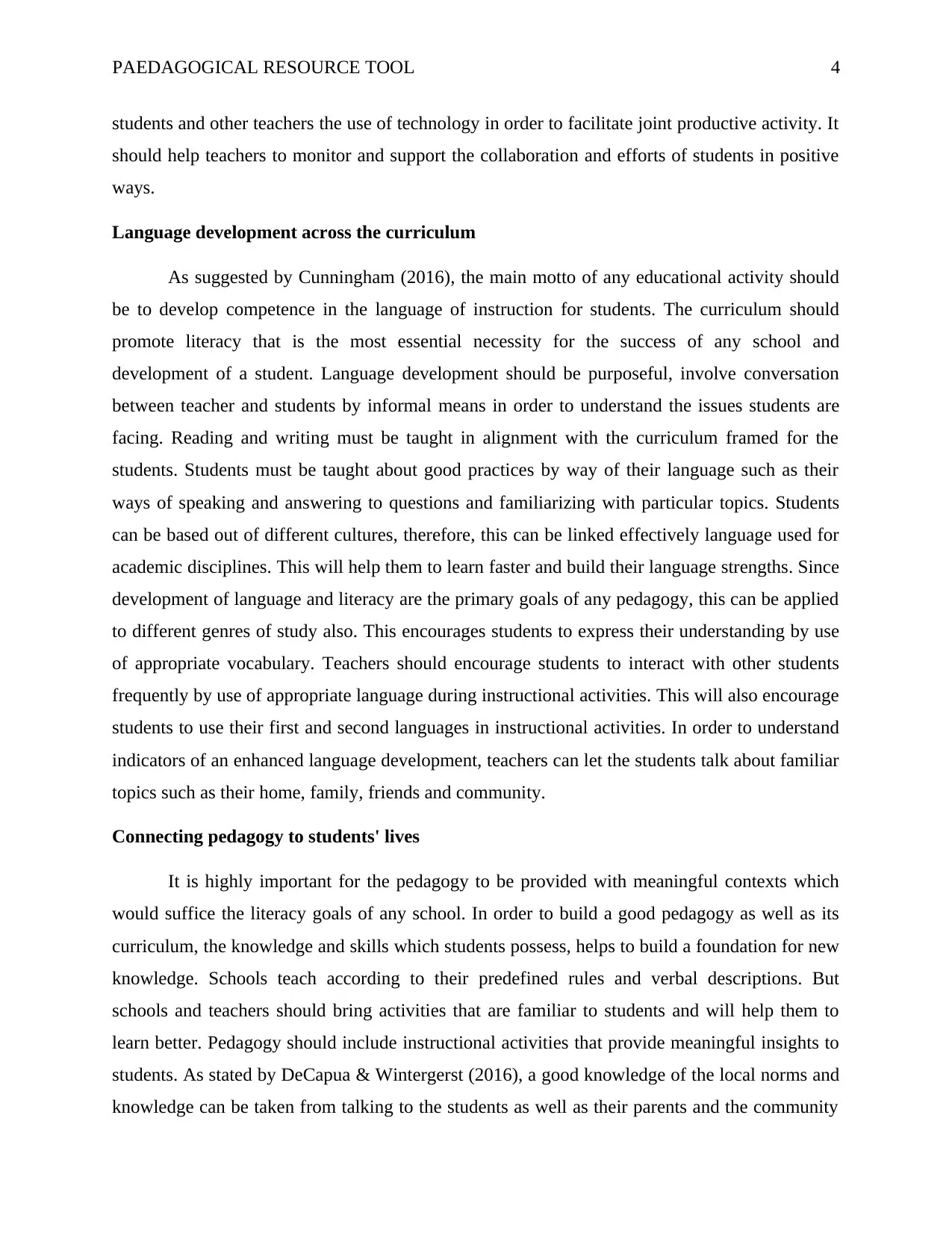
PAEDAGOGICAL RESOURCE TOOL 4
students and other teachers the use of technology in order to facilitate joint productive activity. It
should help teachers to monitor and support the collaboration and efforts of students in positive
ways.
Language development across the curriculum
As suggested by Cunningham (2016), the main motto of any educational activity should
be to develop competence in the language of instruction for students. The curriculum should
promote literacy that is the most essential necessity for the success of any school and
development of a student. Language development should be purposeful, involve conversation
between teacher and students by informal means in order to understand the issues students are
facing. Reading and writing must be taught in alignment with the curriculum framed for the
students. Students must be taught about good practices by way of their language such as their
ways of speaking and answering to questions and familiarizing with particular topics. Students
can be based out of different cultures, therefore, this can be linked effectively language used for
academic disciplines. This will help them to learn faster and build their language strengths. Since
development of language and literacy are the primary goals of any pedagogy, this can be applied
to different genres of study also. This encourages students to express their understanding by use
of appropriate vocabulary. Teachers should encourage students to interact with other students
frequently by use of appropriate language during instructional activities. This will also encourage
students to use their first and second languages in instructional activities. In order to understand
indicators of an enhanced language development, teachers can let the students talk about familiar
topics such as their home, family, friends and community.
Connecting pedagogy to students' lives
It is highly important for the pedagogy to be provided with meaningful contexts which
would suffice the literacy goals of any school. In order to build a good pedagogy as well as its
curriculum, the knowledge and skills which students possess, helps to build a foundation for new
knowledge. Schools teach according to their predefined rules and verbal descriptions. But
schools and teachers should bring activities that are familiar to students and will help them to
learn better. Pedagogy should include instructional activities that provide meaningful insights to
students. As stated by DeCapua & Wintergerst (2016), a good knowledge of the local norms and
knowledge can be taken from talking to the students as well as their parents and the community
students and other teachers the use of technology in order to facilitate joint productive activity. It
should help teachers to monitor and support the collaboration and efforts of students in positive
ways.
Language development across the curriculum
As suggested by Cunningham (2016), the main motto of any educational activity should
be to develop competence in the language of instruction for students. The curriculum should
promote literacy that is the most essential necessity for the success of any school and
development of a student. Language development should be purposeful, involve conversation
between teacher and students by informal means in order to understand the issues students are
facing. Reading and writing must be taught in alignment with the curriculum framed for the
students. Students must be taught about good practices by way of their language such as their
ways of speaking and answering to questions and familiarizing with particular topics. Students
can be based out of different cultures, therefore, this can be linked effectively language used for
academic disciplines. This will help them to learn faster and build their language strengths. Since
development of language and literacy are the primary goals of any pedagogy, this can be applied
to different genres of study also. This encourages students to express their understanding by use
of appropriate vocabulary. Teachers should encourage students to interact with other students
frequently by use of appropriate language during instructional activities. This will also encourage
students to use their first and second languages in instructional activities. In order to understand
indicators of an enhanced language development, teachers can let the students talk about familiar
topics such as their home, family, friends and community.
Connecting pedagogy to students' lives
It is highly important for the pedagogy to be provided with meaningful contexts which
would suffice the literacy goals of any school. In order to build a good pedagogy as well as its
curriculum, the knowledge and skills which students possess, helps to build a foundation for new
knowledge. Schools teach according to their predefined rules and verbal descriptions. But
schools and teachers should bring activities that are familiar to students and will help them to
learn better. Pedagogy should include instructional activities that provide meaningful insights to
students. As stated by DeCapua & Wintergerst (2016), a good knowledge of the local norms and
knowledge can be taken from talking to the students as well as their parents and the community
Paraphrase This Document
Need a fresh take? Get an instant paraphrase of this document with our AI Paraphraser
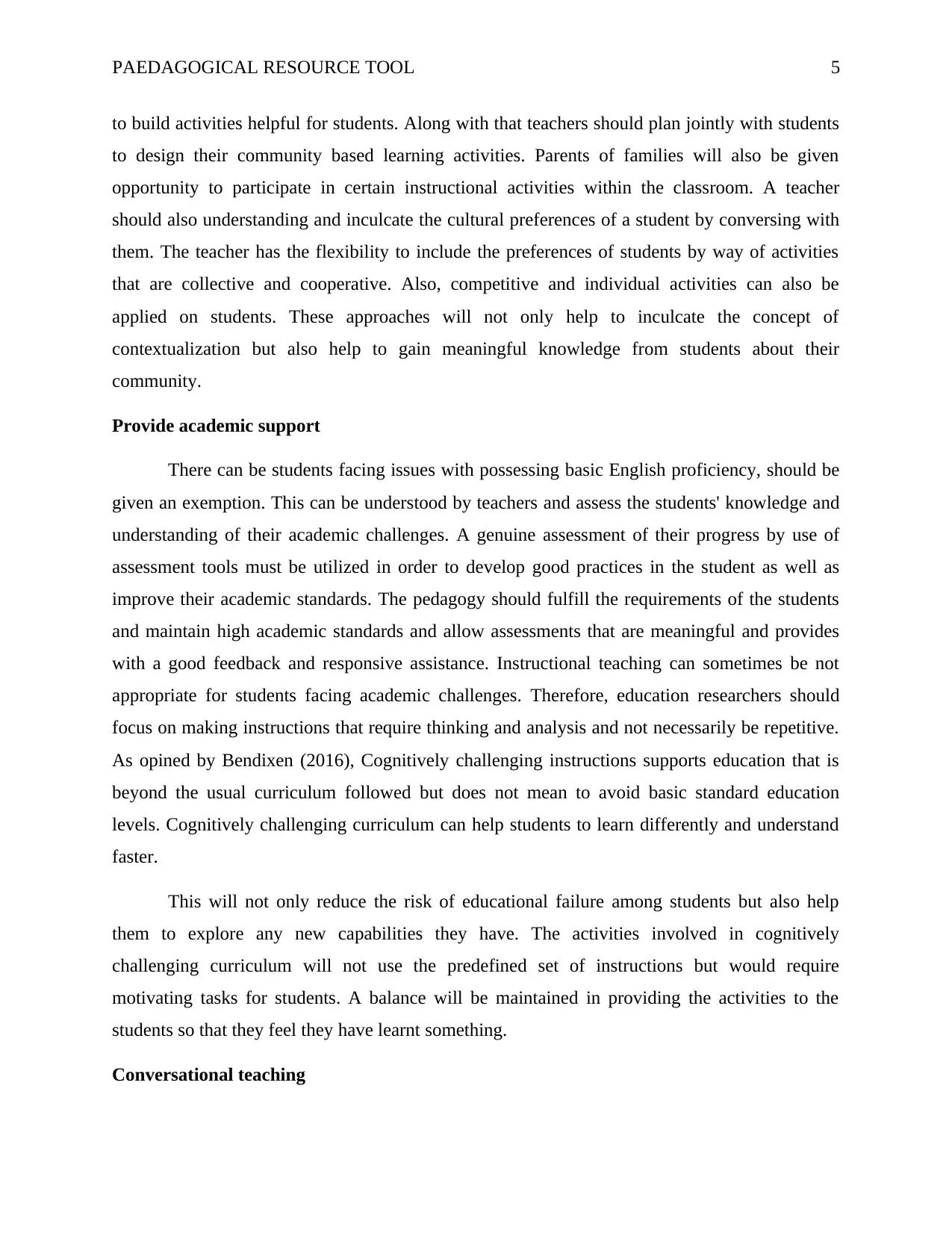
PAEDAGOGICAL RESOURCE TOOL 5
to build activities helpful for students. Along with that teachers should plan jointly with students
to design their community based learning activities. Parents of families will also be given
opportunity to participate in certain instructional activities within the classroom. A teacher
should also understanding and inculcate the cultural preferences of a student by conversing with
them. The teacher has the flexibility to include the preferences of students by way of activities
that are collective and cooperative. Also, competitive and individual activities can also be
applied on students. These approaches will not only help to inculcate the concept of
contextualization but also help to gain meaningful knowledge from students about their
community.
Provide academic support
There can be students facing issues with possessing basic English proficiency, should be
given an exemption. This can be understood by teachers and assess the students' knowledge and
understanding of their academic challenges. A genuine assessment of their progress by use of
assessment tools must be utilized in order to develop good practices in the student as well as
improve their academic standards. The pedagogy should fulfill the requirements of the students
and maintain high academic standards and allow assessments that are meaningful and provides
with a good feedback and responsive assistance. Instructional teaching can sometimes be not
appropriate for students facing academic challenges. Therefore, education researchers should
focus on making instructions that require thinking and analysis and not necessarily be repetitive.
As opined by Bendixen (2016), Cognitively challenging instructions supports education that is
beyond the usual curriculum followed but does not mean to avoid basic standard education
levels. Cognitively challenging curriculum can help students to learn differently and understand
faster.
This will not only reduce the risk of educational failure among students but also help
them to explore any new capabilities they have. The activities involved in cognitively
challenging curriculum will not use the predefined set of instructions but would require
motivating tasks for students. A balance will be maintained in providing the activities to the
students so that they feel they have learnt something.
Conversational teaching
to build activities helpful for students. Along with that teachers should plan jointly with students
to design their community based learning activities. Parents of families will also be given
opportunity to participate in certain instructional activities within the classroom. A teacher
should also understanding and inculcate the cultural preferences of a student by conversing with
them. The teacher has the flexibility to include the preferences of students by way of activities
that are collective and cooperative. Also, competitive and individual activities can also be
applied on students. These approaches will not only help to inculcate the concept of
contextualization but also help to gain meaningful knowledge from students about their
community.
Provide academic support
There can be students facing issues with possessing basic English proficiency, should be
given an exemption. This can be understood by teachers and assess the students' knowledge and
understanding of their academic challenges. A genuine assessment of their progress by use of
assessment tools must be utilized in order to develop good practices in the student as well as
improve their academic standards. The pedagogy should fulfill the requirements of the students
and maintain high academic standards and allow assessments that are meaningful and provides
with a good feedback and responsive assistance. Instructional teaching can sometimes be not
appropriate for students facing academic challenges. Therefore, education researchers should
focus on making instructions that require thinking and analysis and not necessarily be repetitive.
As opined by Bendixen (2016), Cognitively challenging instructions supports education that is
beyond the usual curriculum followed but does not mean to avoid basic standard education
levels. Cognitively challenging curriculum can help students to learn differently and understand
faster.
This will not only reduce the risk of educational failure among students but also help
them to explore any new capabilities they have. The activities involved in cognitively
challenging curriculum will not use the predefined set of instructions but would require
motivating tasks for students. A balance will be maintained in providing the activities to the
students so that they feel they have learnt something.
Conversational teaching
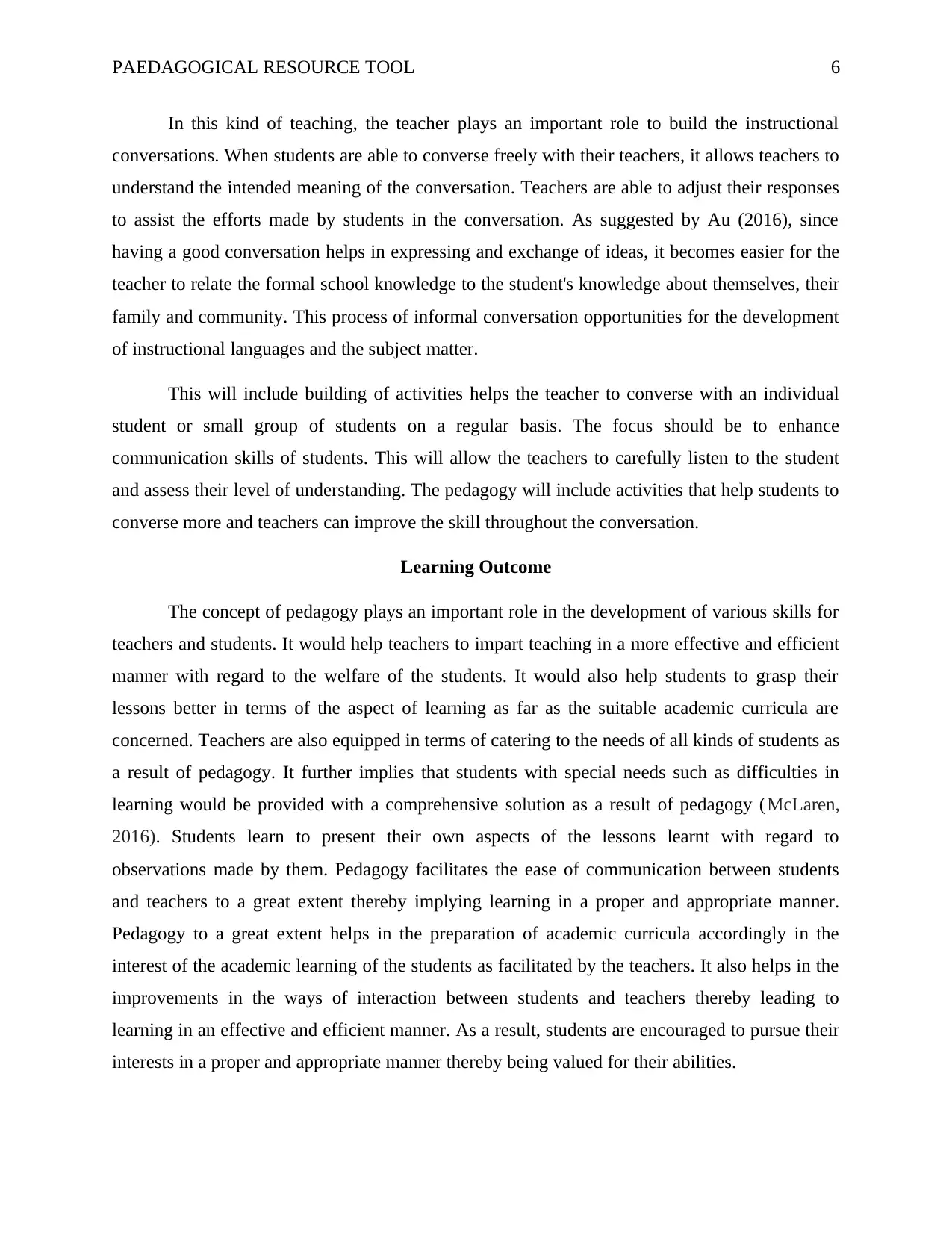
PAEDAGOGICAL RESOURCE TOOL 6
In this kind of teaching, the teacher plays an important role to build the instructional
conversations. When students are able to converse freely with their teachers, it allows teachers to
understand the intended meaning of the conversation. Teachers are able to adjust their responses
to assist the efforts made by students in the conversation. As suggested by Au (2016), since
having a good conversation helps in expressing and exchange of ideas, it becomes easier for the
teacher to relate the formal school knowledge to the student's knowledge about themselves, their
family and community. This process of informal conversation opportunities for the development
of instructional languages and the subject matter.
This will include building of activities helps the teacher to converse with an individual
student or small group of students on a regular basis. The focus should be to enhance
communication skills of students. This will allow the teachers to carefully listen to the student
and assess their level of understanding. The pedagogy will include activities that help students to
converse more and teachers can improve the skill throughout the conversation.
Learning Outcome
The concept of pedagogy plays an important role in the development of various skills for
teachers and students. It would help teachers to impart teaching in a more effective and efficient
manner with regard to the welfare of the students. It would also help students to grasp their
lessons better in terms of the aspect of learning as far as the suitable academic curricula are
concerned. Teachers are also equipped in terms of catering to the needs of all kinds of students as
a result of pedagogy. It further implies that students with special needs such as difficulties in
learning would be provided with a comprehensive solution as a result of pedagogy (McLaren,
2016). Students learn to present their own aspects of the lessons learnt with regard to
observations made by them. Pedagogy facilitates the ease of communication between students
and teachers to a great extent thereby implying learning in a proper and appropriate manner.
Pedagogy to a great extent helps in the preparation of academic curricula accordingly in the
interest of the academic learning of the students as facilitated by the teachers. It also helps in the
improvements in the ways of interaction between students and teachers thereby leading to
learning in an effective and efficient manner. As a result, students are encouraged to pursue their
interests in a proper and appropriate manner thereby being valued for their abilities.
In this kind of teaching, the teacher plays an important role to build the instructional
conversations. When students are able to converse freely with their teachers, it allows teachers to
understand the intended meaning of the conversation. Teachers are able to adjust their responses
to assist the efforts made by students in the conversation. As suggested by Au (2016), since
having a good conversation helps in expressing and exchange of ideas, it becomes easier for the
teacher to relate the formal school knowledge to the student's knowledge about themselves, their
family and community. This process of informal conversation opportunities for the development
of instructional languages and the subject matter.
This will include building of activities helps the teacher to converse with an individual
student or small group of students on a regular basis. The focus should be to enhance
communication skills of students. This will allow the teachers to carefully listen to the student
and assess their level of understanding. The pedagogy will include activities that help students to
converse more and teachers can improve the skill throughout the conversation.
Learning Outcome
The concept of pedagogy plays an important role in the development of various skills for
teachers and students. It would help teachers to impart teaching in a more effective and efficient
manner with regard to the welfare of the students. It would also help students to grasp their
lessons better in terms of the aspect of learning as far as the suitable academic curricula are
concerned. Teachers are also equipped in terms of catering to the needs of all kinds of students as
a result of pedagogy. It further implies that students with special needs such as difficulties in
learning would be provided with a comprehensive solution as a result of pedagogy (McLaren,
2016). Students learn to present their own aspects of the lessons learnt with regard to
observations made by them. Pedagogy facilitates the ease of communication between students
and teachers to a great extent thereby implying learning in a proper and appropriate manner.
Pedagogy to a great extent helps in the preparation of academic curricula accordingly in the
interest of the academic learning of the students as facilitated by the teachers. It also helps in the
improvements in the ways of interaction between students and teachers thereby leading to
learning in an effective and efficient manner. As a result, students are encouraged to pursue their
interests in a proper and appropriate manner thereby being valued for their abilities.
⊘ This is a preview!⊘
Do you want full access?
Subscribe today to unlock all pages.

Trusted by 1+ million students worldwide
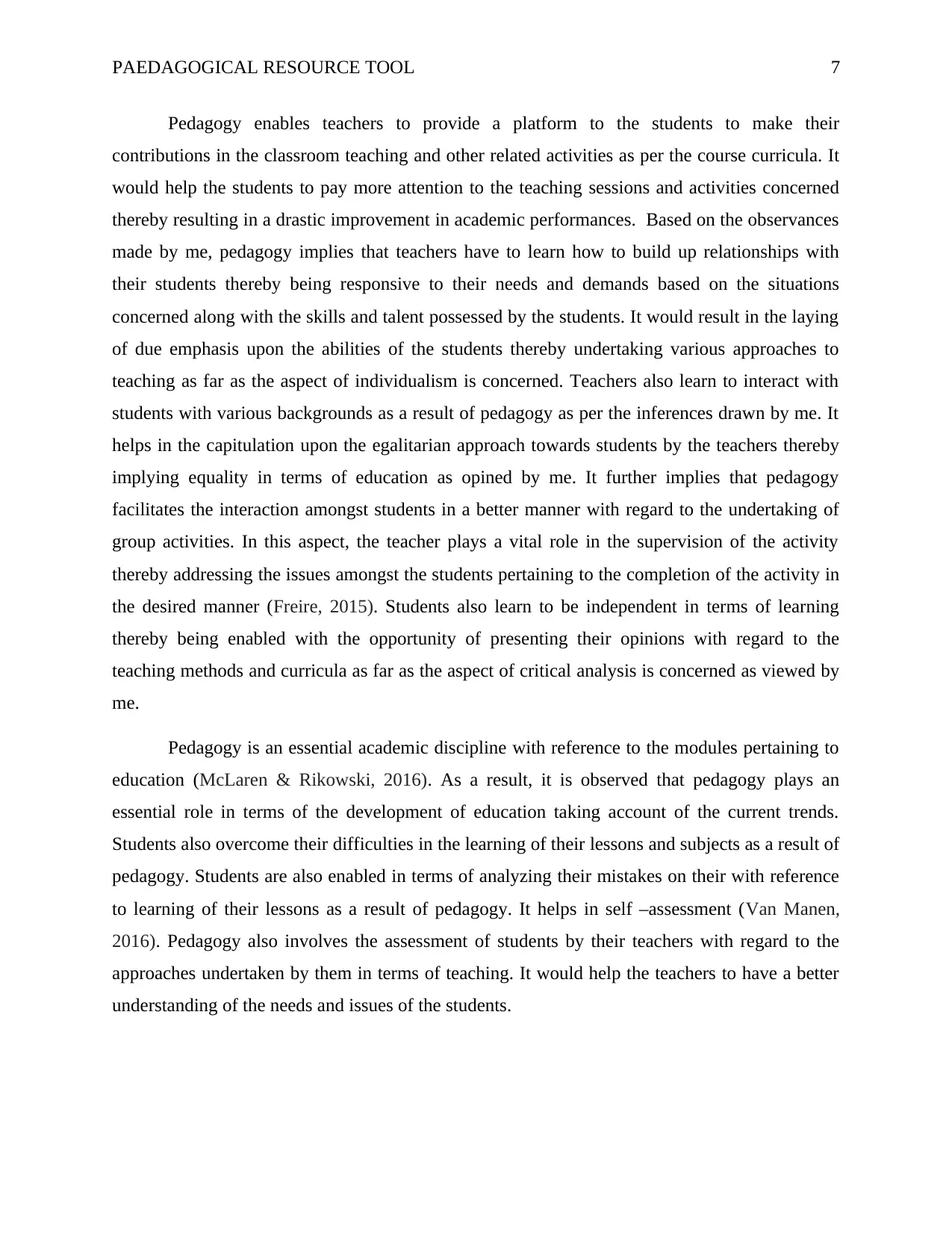
PAEDAGOGICAL RESOURCE TOOL 7
Pedagogy enables teachers to provide a platform to the students to make their
contributions in the classroom teaching and other related activities as per the course curricula. It
would help the students to pay more attention to the teaching sessions and activities concerned
thereby resulting in a drastic improvement in academic performances. Based on the observances
made by me, pedagogy implies that teachers have to learn how to build up relationships with
their students thereby being responsive to their needs and demands based on the situations
concerned along with the skills and talent possessed by the students. It would result in the laying
of due emphasis upon the abilities of the students thereby undertaking various approaches to
teaching as far as the aspect of individualism is concerned. Teachers also learn to interact with
students with various backgrounds as a result of pedagogy as per the inferences drawn by me. It
helps in the capitulation upon the egalitarian approach towards students by the teachers thereby
implying equality in terms of education as opined by me. It further implies that pedagogy
facilitates the interaction amongst students in a better manner with regard to the undertaking of
group activities. In this aspect, the teacher plays a vital role in the supervision of the activity
thereby addressing the issues amongst the students pertaining to the completion of the activity in
the desired manner (Freire, 2015). Students also learn to be independent in terms of learning
thereby being enabled with the opportunity of presenting their opinions with regard to the
teaching methods and curricula as far as the aspect of critical analysis is concerned as viewed by
me.
Pedagogy is an essential academic discipline with reference to the modules pertaining to
education (McLaren & Rikowski, 2016). As a result, it is observed that pedagogy plays an
essential role in terms of the development of education taking account of the current trends.
Students also overcome their difficulties in the learning of their lessons and subjects as a result of
pedagogy. Students are also enabled in terms of analyzing their mistakes on their with reference
to learning of their lessons as a result of pedagogy. It helps in self –assessment (Van Manen,
2016). Pedagogy also involves the assessment of students by their teachers with regard to the
approaches undertaken by them in terms of teaching. It would help the teachers to have a better
understanding of the needs and issues of the students.
Pedagogy enables teachers to provide a platform to the students to make their
contributions in the classroom teaching and other related activities as per the course curricula. It
would help the students to pay more attention to the teaching sessions and activities concerned
thereby resulting in a drastic improvement in academic performances. Based on the observances
made by me, pedagogy implies that teachers have to learn how to build up relationships with
their students thereby being responsive to their needs and demands based on the situations
concerned along with the skills and talent possessed by the students. It would result in the laying
of due emphasis upon the abilities of the students thereby undertaking various approaches to
teaching as far as the aspect of individualism is concerned. Teachers also learn to interact with
students with various backgrounds as a result of pedagogy as per the inferences drawn by me. It
helps in the capitulation upon the egalitarian approach towards students by the teachers thereby
implying equality in terms of education as opined by me. It further implies that pedagogy
facilitates the interaction amongst students in a better manner with regard to the undertaking of
group activities. In this aspect, the teacher plays a vital role in the supervision of the activity
thereby addressing the issues amongst the students pertaining to the completion of the activity in
the desired manner (Freire, 2015). Students also learn to be independent in terms of learning
thereby being enabled with the opportunity of presenting their opinions with regard to the
teaching methods and curricula as far as the aspect of critical analysis is concerned as viewed by
me.
Pedagogy is an essential academic discipline with reference to the modules pertaining to
education (McLaren & Rikowski, 2016). As a result, it is observed that pedagogy plays an
essential role in terms of the development of education taking account of the current trends.
Students also overcome their difficulties in the learning of their lessons and subjects as a result of
pedagogy. Students are also enabled in terms of analyzing their mistakes on their with reference
to learning of their lessons as a result of pedagogy. It helps in self –assessment (Van Manen,
2016). Pedagogy also involves the assessment of students by their teachers with regard to the
approaches undertaken by them in terms of teaching. It would help the teachers to have a better
understanding of the needs and issues of the students.
Paraphrase This Document
Need a fresh take? Get an instant paraphrase of this document with our AI Paraphraser
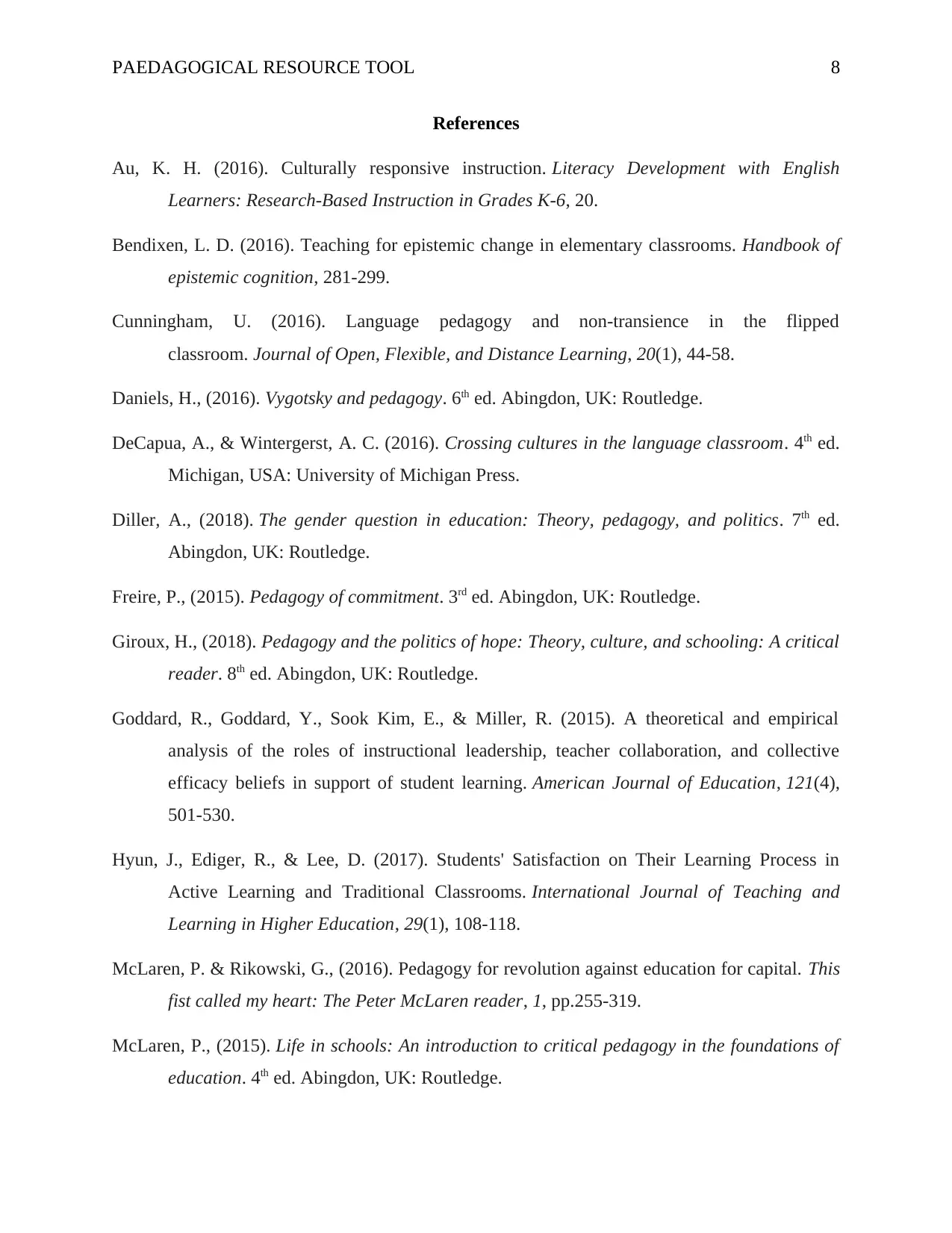
PAEDAGOGICAL RESOURCE TOOL 8
References
Au, K. H. (2016). Culturally responsive instruction. Literacy Development with English
Learners: Research-Based Instruction in Grades K-6, 20.
Bendixen, L. D. (2016). Teaching for epistemic change in elementary classrooms. Handbook of
epistemic cognition, 281-299.
Cunningham, U. (2016). Language pedagogy and non-transience in the flipped
classroom. Journal of Open, Flexible, and Distance Learning, 20(1), 44-58.
Daniels, H., (2016). Vygotsky and pedagogy. 6th ed. Abingdon, UK: Routledge.
DeCapua, A., & Wintergerst, A. C. (2016). Crossing cultures in the language classroom. 4th ed.
Michigan, USA: University of Michigan Press.
Diller, A., (2018). The gender question in education: Theory, pedagogy, and politics. 7th ed.
Abingdon, UK: Routledge.
Freire, P., (2015). Pedagogy of commitment. 3rd ed. Abingdon, UK: Routledge.
Giroux, H., (2018). Pedagogy and the politics of hope: Theory, culture, and schooling: A critical
reader. 8th ed. Abingdon, UK: Routledge.
Goddard, R., Goddard, Y., Sook Kim, E., & Miller, R. (2015). A theoretical and empirical
analysis of the roles of instructional leadership, teacher collaboration, and collective
efficacy beliefs in support of student learning. American Journal of Education, 121(4),
501-530.
Hyun, J., Ediger, R., & Lee, D. (2017). Students' Satisfaction on Their Learning Process in
Active Learning and Traditional Classrooms. International Journal of Teaching and
Learning in Higher Education, 29(1), 108-118.
McLaren, P. & Rikowski, G., (2016). Pedagogy for revolution against education for capital. This
fist called my heart: The Peter McLaren reader, 1, pp.255-319.
McLaren, P., (2015). Life in schools: An introduction to critical pedagogy in the foundations of
education. 4th ed. Abingdon, UK: Routledge.
References
Au, K. H. (2016). Culturally responsive instruction. Literacy Development with English
Learners: Research-Based Instruction in Grades K-6, 20.
Bendixen, L. D. (2016). Teaching for epistemic change in elementary classrooms. Handbook of
epistemic cognition, 281-299.
Cunningham, U. (2016). Language pedagogy and non-transience in the flipped
classroom. Journal of Open, Flexible, and Distance Learning, 20(1), 44-58.
Daniels, H., (2016). Vygotsky and pedagogy. 6th ed. Abingdon, UK: Routledge.
DeCapua, A., & Wintergerst, A. C. (2016). Crossing cultures in the language classroom. 4th ed.
Michigan, USA: University of Michigan Press.
Diller, A., (2018). The gender question in education: Theory, pedagogy, and politics. 7th ed.
Abingdon, UK: Routledge.
Freire, P., (2015). Pedagogy of commitment. 3rd ed. Abingdon, UK: Routledge.
Giroux, H., (2018). Pedagogy and the politics of hope: Theory, culture, and schooling: A critical
reader. 8th ed. Abingdon, UK: Routledge.
Goddard, R., Goddard, Y., Sook Kim, E., & Miller, R. (2015). A theoretical and empirical
analysis of the roles of instructional leadership, teacher collaboration, and collective
efficacy beliefs in support of student learning. American Journal of Education, 121(4),
501-530.
Hyun, J., Ediger, R., & Lee, D. (2017). Students' Satisfaction on Their Learning Process in
Active Learning and Traditional Classrooms. International Journal of Teaching and
Learning in Higher Education, 29(1), 108-118.
McLaren, P. & Rikowski, G., (2016). Pedagogy for revolution against education for capital. This
fist called my heart: The Peter McLaren reader, 1, pp.255-319.
McLaren, P., (2015). Life in schools: An introduction to critical pedagogy in the foundations of
education. 4th ed. Abingdon, UK: Routledge.
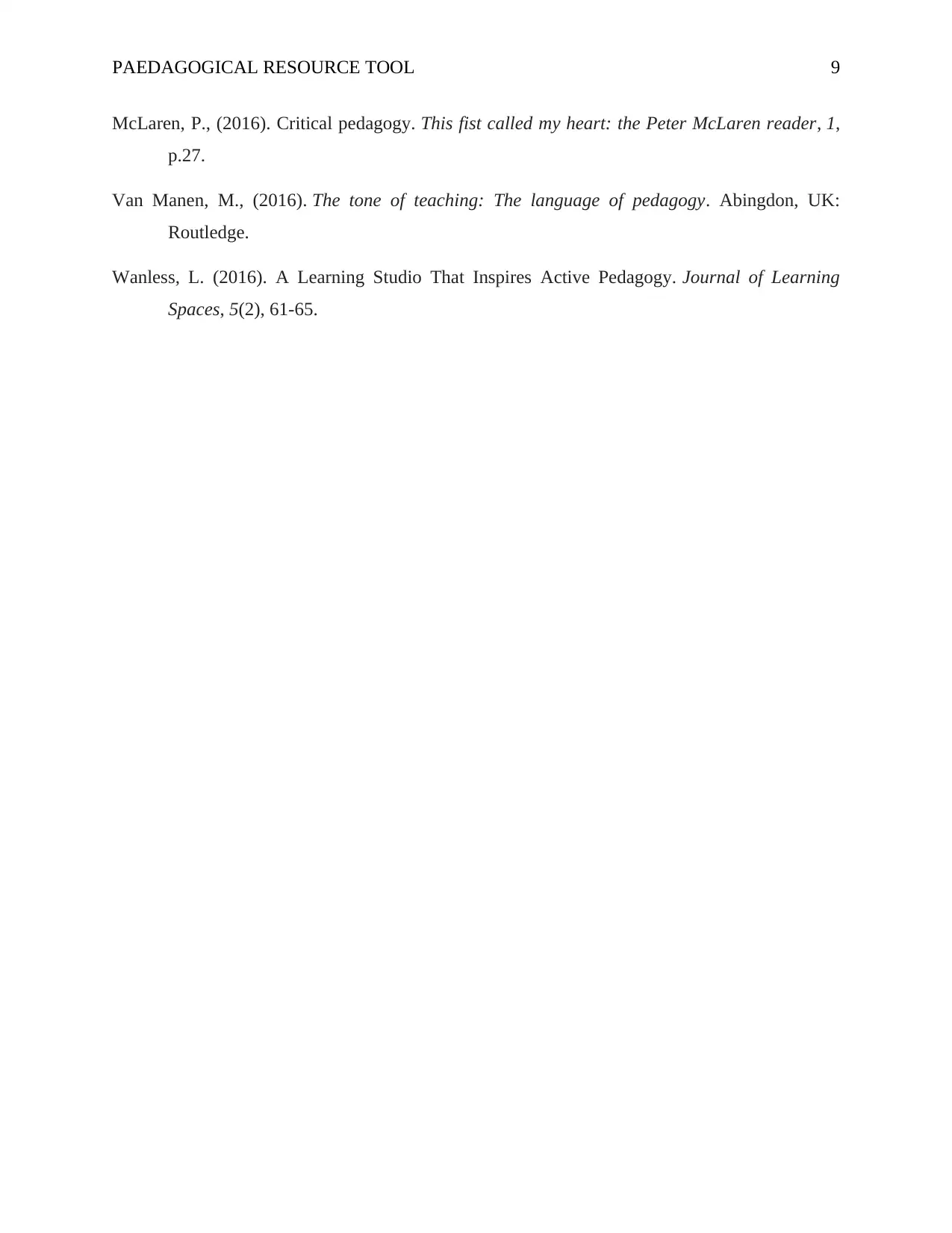
PAEDAGOGICAL RESOURCE TOOL 9
McLaren, P., (2016). Critical pedagogy. This fist called my heart: the Peter McLaren reader, 1,
p.27.
Van Manen, M., (2016). The tone of teaching: The language of pedagogy. Abingdon, UK:
Routledge.
Wanless, L. (2016). A Learning Studio That Inspires Active Pedagogy. Journal of Learning
Spaces, 5(2), 61-65.
McLaren, P., (2016). Critical pedagogy. This fist called my heart: the Peter McLaren reader, 1,
p.27.
Van Manen, M., (2016). The tone of teaching: The language of pedagogy. Abingdon, UK:
Routledge.
Wanless, L. (2016). A Learning Studio That Inspires Active Pedagogy. Journal of Learning
Spaces, 5(2), 61-65.
⊘ This is a preview!⊘
Do you want full access?
Subscribe today to unlock all pages.

Trusted by 1+ million students worldwide
1 out of 9
Related Documents
Your All-in-One AI-Powered Toolkit for Academic Success.
+13062052269
info@desklib.com
Available 24*7 on WhatsApp / Email
![[object Object]](/_next/static/media/star-bottom.7253800d.svg)
Unlock your academic potential
Copyright © 2020–2025 A2Z Services. All Rights Reserved. Developed and managed by ZUCOL.





